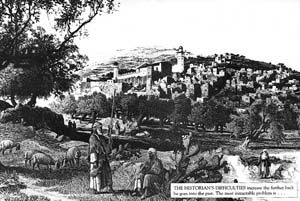The Separate Traditions of Abraham and Jacob, Roland de Vaux, Biblical Archaeology Review (6:04), Jul/Aug 1980.

Hebron. Harry Fenn and J. D. Woodward; from Colonel Sir Charles W. Wilson, Picturesque Palestine (1883)
The historian’s difficulties increase the further back he goes into past. The most intractable problem is … that of the first ancestors whom Israel claimed as her own, the patriarchs Abraham, Isaac and Jacob, whose “history” is told in Genesis 12–35. The history of Joseph, which occupies the rest of Genesis with the exception of Genesis 38 and 49, belongs to the following period, that of Israel’s stay in Egypt.
Despite the enormous amount of work that has been done during the past two centuries in the field of literary criticism, especially in connection with the Pentateuch in general and with Genesis in particular, the conclusions that have been reached are far from unanimous and the foundations on which this literary criticism has been based have been called into question again and again. The view that is still encountered more frequently than any other is based on the documentary hypothesis, according to which the Pentateuch can be traced back to three or four great sources—the Yahwistic source (J), the Elohistic source (E) and the priestly source (P). Deuteronomy is a separate source and is designated (D). General agreement has been reached as to how, at least in broad outline, the text should be divided between these three sources.
Read the rest of The Separate Traditions of Abraham and Jacob in the online Biblical Archaeology Society Library.



